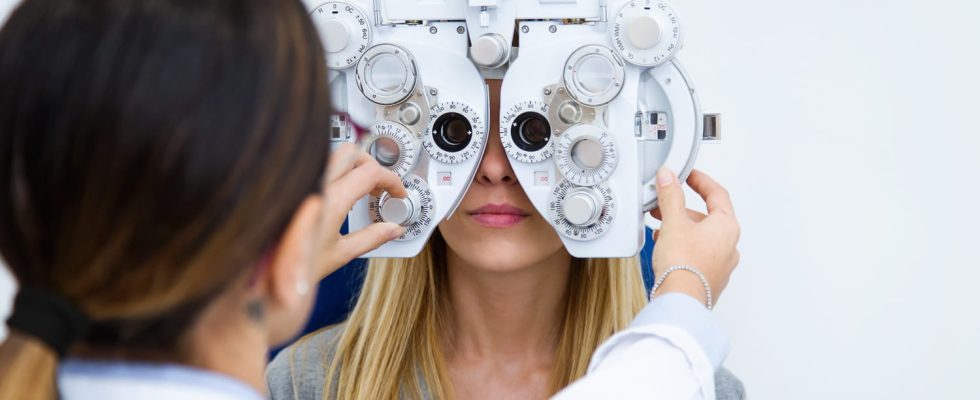The ophthalmologist (or ophthalmologist, it’s the same profession) is the specialist in eye diseases. What is his role ? When to consult it? What exams does he take? An eye test?
What is the role of an ophthalmologist?
The ophthalmologist, or ophthalmologist (this is the same profession!), is specialist in the diagnosis and treatment of eye diseases. He is also in charge of correct vision problems. Thanks to devices allowing the study of vision and the integrity of the structures of the eye, he can detect visual disorders and determine the methods of correction. It is in particular the ophthalmologist who prescribed corrective lenses adapted to different vision problems, such as myopia, hyperopia, presbyopia or astigmatism. He can also perform eye surgery, such as the replacement of the lens in the event of cataract, the most practiced operation in France, or surgery for myopia. He can also treat certain eye disorders with laser.
What is the difference between an ophthalmologist and an optician?
The optician is the person who manufactures glasses or contact lenses. It is not a medical profession. He has the ability to adapt the lenses to a person’s sight but is not able to make a diagnosis or prescribe eyeglasses.
What is the difference between an ophthalmologist and an orthoptist?
Orthoptics is a paramedical profession. The role of the orthoptist is to rehabilitate binocular vision disorders (strabismus for example). It is responsible for restoring the parallelism of the eyes. It works on prescription from the ophthalmologist.
Indications: when to consult an ophthalmologist?
Since sight is the main transmitter of information to our brain, it must be monitored from an early age. In particular, checks must be performed at 6 months of age, when the child enters CP, then in 6th grade. Also, a child who blinks, has irritated eyes, headaches, squints, or is very sensitive to light should be referred to an ophthalmologist. Indeed, an uncorrected vision disorder can lead to difficulties, especially in the learning process. Also, after 40 years, presbyopia tends to develop. It is therefore advisable to have your eyesight checked approximately every 3 years.
What examinations or tests does an ophthalmologist do?
During a consultation, the ophthalmologist always begins by a patient interview in order to understand what drives him to consult. In particular, he learns about family and personal history. He then proceeds to the evaluation of visual acuity, by having letters of different sizes read, with corrective lenses. The ophthalmologist also systematically measures eye pressure And check eye alignment. Finally, the examination of the back of the eye, which is not systematic, allows the specialist to see the state of the retina. This examination requires preparation with pupillary dilation, which can interfere with sight for a few hours. Then, depending on the pathology, he recommends wearing corrective lenses, rehabilitation sessions or even surgery.
The choice of ophthalmologist depends on the pathology to be treated. Eye diseases requiring technical or surgical care are preferentially monitored in hospital. Optical care and the prescription of corrective lenses can be done in a town ophthalmology office. The ophthalmologist can practice in his own cabinet in liberal, or within a hospital center. In the second case, it is possible for him to teach at the faculty. The choice of ophthalmologist will depend on the pathology. In the event of eye surgery, referral will be made to a hospital ophthalmologist.
What degree to become an ophthalmologist?
There ophthalmologist training takes place over 5 yearsAfter 6 years of study in medical school. Medical studies are accessible at baccalaureate level. If the scientific baccalaureate is not compulsory, it is strongly recommended. Training to specialize as an ophthalmologist is accessible after six years of medical studies. The choice of specialization is made according to the ranking from the National Ranking Tests (ECN).
Obtaining the DES in ophthalmology takes 5 years. These are mainly practical lessons, including several mandatory internships in hospitals and extra-hospital organizations. The theoretical lessons covered during the training: the general principles of surgery, the anatomy of the eyeball, genetics, immunology and oncology, the pharmacology of drugs used in ophthalmology, epidemiology, diagnosis and treatment of diseases of the eyeball , management of diseases leading to blindness and related to aging and emergencies in ophthalmology. The DES is obtained after validation of five years of training and internships. The defense of a thesis allows to obtain the Diploma of Doctor of Medicine.
What is the price of a consultation? Is it reimbursed?
A consultation with a sector 1 ophthalmologist is 30 euros (if you have a declared attending physician) or 35 euros (if you don’t have one). Despite the introduction of the coordinated care pathway, ophthalmologists can be consulted freely by patients, without them having to go through their doctor. The consultation is paid for by the health insurance fund at 70% height and the supplement is reimbursed by mutual insurance companies.
